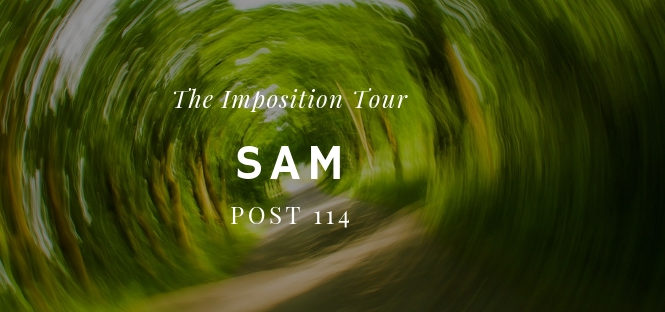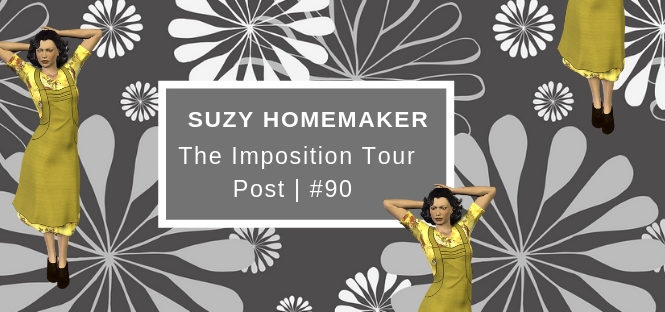This entry is REALLY long… So before you start, might I suggest a beverage?
Anyway. I’m just stalling. Here goes nothing.
There was a strange little coffee shop in Salt Lake that Sam took me to the very first time we sat down to discuss the pilot.
It was a dingy old house that had been converted into a meeting place for what I used to think of as the “winter hippies.” Most of the people who hung out at that coffee house were on the dirty side, and, they all seemed disenfranchised and kind of lost. They mostly wore grungy woolen beanies over unwashed hair, and, most of them wore shoes that didn’t seem warm enough to me.
One time, I saw a guy wearing a hood that made him look just like a wolf — which seemed plenty warm — and a bit odd — but then when I looked at his feet, he was wearing some old rubber flip flops.
Later on, I would refer to this sad little place as the “Bendy Twisty Coffee Shop” when Sam would ask me where we should meet. It just seemed like the back stories of everyone who gathered to drink those smelly chai teas on the beat up sofas had taken a jagged turn in their lives that left them searching and bending like un-tethered limbs without direction.
Sam seemed to know a lot of the winter hippies who were regulars there, and the few times that we did agree to meet there, I was always left with a haunting sadness for the things I didn’t know about Sam’s life, or the lives of his twisty little friends.
I suppose I shouldn’t criticize Sam’s favorite place to hang out and write because the one I preferred for our jam sessions wasn’t exactly a stiff and predictable Starbucks. The coffee shop I liked was in the neighborhood where Lou and I were planning to live — if the company ever got funded. It was one of those indie-type coffee houses where everyone is vegan, and the tattooed baristas get paid extra to make you feel bad about your store-bought clothing — and, the clientele is equally judgey, too.
But I liked meeting there because the coffee was really good — and made from beans that were “conflict-free” — and, there was always a lot of stuff going on around me that seemed stranger than any of the fiction I could create in my mind.
For example, one day, when I was waiting for Sam, I looked up to see a middle-aged woman and two “tween-aged” boys sitting at the table next to me. The boys had bushy orange hair, and they were each wearing colorful corduroy pants that were super snug and way too short. In fact, the pants didn’t even come close to covering either boy’s fuzzy, pre-pubescent ankles. They were also wearing fur-lined cloth moccasins and plaid flannel shirts in colors that completely clashed with their cords.
When my eyes were finally able to focus on what they were doing, I realized that the frazzled looking woman at the table was teaching these two very dorky boys how to knit their own wool socks.
As this very special winter hippy exchange was taking shape next to me, some commotion in the far corner got my attention, and suddenly, I was watching a group of motley musicians setting up chairs and music stands.
I watched as a woman dressed in a brown prairie skirt and messy yellow sweater unwrapped her Autoharp, while another lady wearing a pointy hat and moon boots started assembling her oboe. Before long, a very large winter hippy dressed in a floor-length coat (that looked like a Native American Indian blanket) arrived with his standup bass, and, a very skinny lady wearing skimpy leggings, a short-sleeved T-shirt, and a down-filled vest walked in behind him carrying her pan flute. They were just gearing up for noontime jam session that would be the perfect music to help the two winter hippie children reinforce the toes of their homemade socks.
My reality in Utah was weird, but the fiction I started to create with Sam was super satisfying.
After Sam finished reading my novel, he told me he could get a better sense of how he could help me if I let him read the pilot I wrote on my own. After reading the script, Sam wasn’t as nice as Roy had been — in fact, he laughed out loud after he read the first few pages. I remember feeling so vulnerable because I wanted Sam to believe I could do this, and, I was incredibly eager to learn. So I did my best to keep it together and let my embarrassment ebb so that Sam could teach me how to write a proper script.
Sam told me I did have a couple of things going for me. For one thing, he thought my novel was a great read, and the story we had to work with was solid. Secondly, he said that I had a true talent for writing dialog. That’s one of the most difficult things to write really well, he told me, and the fact that the only thing in my pilot that was actually working was the authenticity of the dialog between my characters meant that I already had a lot to work with.
Sam said writing the pilot plus three additional episodes would be easy for him, and I believed him. His confidence gave me confidence, too, and right away, I felt myself believing.
I remember hanging on every word Sam said the first couple of times we met. He was an excellent teacher and storyteller — he was sharp, and got straight to the point on how an adaptation works; and, when he’d tell me a story about his life, he could easily lull me into reliving his experiences with him.
Sam often told me sad stories about his past, and there was a dark and gloomy burden that he seemed to carry with him that mixed in with nearly everything Sam told me about himself. But it made me feel honored that he trusted me with some of his greatest revelations about his life, and, I wanted to be as supportive of him as he was of me.
Sam and I didn’t write together right away — in fact, the truth is, we never “wrote” anything together at all.
Sam just basically showed up to meet with me a few times a week, and we’d banter back and forth about the characters in my narrative, and how we each saw them transforming from descriptions in a book into real live people with thoughts, feelings, and driving convictions.
He’d always suggest that we collaborate by having him write one episode — that usually emphasized the plot line of one my male characters — and I could write an episode that mostly involved one of my two main female lead characters.
I remember being excited about this collaborative style of writing, but Sam never did his part. He’d say he was going to write, but then he’d get too busy, or he’d never find his flow when he had time to write. So during the first month or so, we mostly just spent time riffing about the narrative, and discovering who my fiction characters were going to be in the real world.
At any given time, Sam and I would morph into one of my characters.
We’d talk in the personas of the people I had created in my book, and infer feelings, thoughts, and emotions we each believed they really had. Sam often wore the role of Scott LaMotte — the best friend of Eloise Butts, who was secretly in love with her. Then, at other times, Sam would be Marco Maselli — the Italian pilot who relentlessly pursued Eloise as soon as she moved to Tuscany for a few months.
I was pretty much always Eloise, although, at times, I found ways to turn into one of my male characters, too — or, my only vixen character, Gabby Menedez. But Sam seemed to really like being Gabby, too. She was morally confused and in deep need of finding a love that was lasting and real. Sam and I both saw all of the good in Gabby, even though her exterior beauty made it easier for her to live her life as the sexy goddess that everyone expected her to be.
Because I wrote the novel in first person, and everything was held together by Eloise, each character in the story had this newfound permission to be whatever I decided they should be in the series. So Sam and I would sometimes spend our time together creating new and different back stories for all of my characters (except for Eloise) and, we’d explore potential pivots and departures we could create after we merely borrowed elements from my book.
I have to tell you something honestly. Sam would sometimes make suggestions about ways we should change my story that kind of offended me; but once we’d part ways, I’d start to think about his idea. Very often, it seemed to me like Sam didn’t really understand the character at all. But then I’d just try on his idea and play around with it in my own head. And then suddenly, I’d be off the races and the pivot outside of myself created this new way to look at the life of one of my characters with greater interest.
It was like the character I had created in my book had a secret life I didn’t know about until Sam triggered me to see one of his or her flaws. That was the amazing part of spending time with Sam. He’d challenge me to think about my own story differently. And, I loved that. So much.
Right after our first few creative sessions, I started writing the pilot again on my own — with some of Sam’s inspiration in my head, of course. But once I actually started the writing, things got very exciting for me. It was so much easier than I thought it would be to write a script once I knew to keep my focus on the only thing the characters could count on from me: the dialog.
My only real job was feeding the actors the lines they’d need to make my characters real; and, if I did it well, the layers of Truth and emotion that I embedded in their lives would miraculously give them everything they’d need to make people care about them. I loved every minute of the writing process — and I’d spend hours and hours on my own in the very clean and tidy “coffee and cocoa” shop near Lou’s office.
It was there that I got totally lost in my bliss…
Later, when Sam and I would meet up at my indie coffee shop, Sam would sit across a dirty table from me, and I’d read what I wrote out loud to him. Sometimes when I’d be reading, I’d notice that Sam would start to fidget. I learned fairly quickly that a fidgeting Sam meant he liked what I wrote. It was almost as if he was personally reacting to the narrative — which was sometimes full of crazy tensions for the characters, and awkward realities about love, sex, and romance that we were trying to shape into the story.
When I’d finish reading something to Sam, he’d very often smile at me, and then seem to contain his bigger feelings in statements like, “Yep. That’s good.”
In truth, I think Sam was often surprised by how one of the tiniest of his ideas would somehow morph into something huge in my imagination, and I could tell the story was starting to affect him the way it was affecting me. The story in the series was becoming personal to both of us now. And, the writing was coming so easily for me, so I felt thrilled that I was able to experience my very own characters in a brand new way.
Looking back now, I realize that Sam and I spent most of our time together in this alternate reality where neither of us was real, and we’d talk in this weird Hurricane Season shorthand that mixed the metaphors of our fiction with some part of our real lives, too. But. I also think we both sensed things were getting too intense, and some of the lines between our fiction and reality were getting a little blurry.
The tension was clearly useful, but I know I sensed it was also dangerous.
During the four months that I spent working with Sam, he “fell in love” with four different women — two of which he told me were “the one.”
The first half hour or so of most of our creative sessions was spent with Sam filling me on in the Peyton Place that was his life in Salt Lake City. He ran in a crazy, but tight-knit circle of winter hippies, and he’d seem to fall in love very easily. However, there was this little part of me that suspected that Sam was self-protecting himself from me by pursuing so many women all at once. We had started getting too close, and I was married to a man that Sam knew and repeatedly told me he respected.
So I invested my listening into Sam’s love life and encouraged him to pursue the two most serious girls with conviction. I often borrowed emotions from Sam’s real-life dating dramas for my writing, and when Sam would add his perspectives into the mix of details swirling around our fiction, I told myself that everything I was learning about him was “useful.”
I told myself that as long as anything Sam made me feel was used in the writing, it was safe and OK.
But I think I knew things were getting “unsafe” for us whenever Sam was riffing about the Gabby character in my story. He’d talk about her like she was in pain, and that what we saw on the surface wasn’t even close to who she wanted to be, or how she wanted to live her life. When Sam suggested that Scott start pursuing Gabby — which is a huge and very radical departure from my book — the way he defended his idea seemed like it was important for him to express to me.
Later, when I was writing on my own, and I made my first attempt to write the scene the way Sam suggested, I felt like I was betraying Scott’s purity, goodness, and integrity in some way. I recall that it actually hurt me — as if I could feel Scott’s feelings as my own. But I wrote the scene anyway. And somehow, it worked — brilliantly. It created the perfect conflict that was missing in the episode I was writing, and I remember being amazed.
I’m not sure if Sam realized this or not, but he was quite skilled at pushing me to make changes to my existing story without losing track of who I was when I first created the narrative. He seemed to help me find my voice in the mix differently, and then he’d show me how to use my newfound insights properly in this new format of storytelling. It was liberating… And, I trusted Sam a great deal with this story that mattered so much to me. So maybe that’s the reason why Sam disappointed me so easily.
I trusted him too much, and I knew in my heart that I shouldn’t.
As great as Sam was in my eyes, he could also be a very unreliable person. He’d send me cryptic (and badly worded) text messages about our next creative session, and when I’d reply, sometimes he’d outright blow me off for a few days. He’d eventually resurface with some lame excuse. So I’d ask him to tell me if I was asking too much of him to keep working with me. He always said no — he loved what we were writing, and then he’d make plans to meet me right away.
But Sam was very passive with me. He left huge gaps in his accounts of his life that I felt were off limits. I respected his privacy, of course, but when Sam would go dark on me, it was difficult for me to figure out what I should think. So I’d wait a few days, and then text him to see when we could meet up.
He’d always text back right away with, “happy u finally texted,” or, “so glad to finally here from u” — which were problematic texts for me for more than one reason. (But it was mostly the subtext that was troubling.)
Frankly, his text communication was just plain annoying, but it was Sam’s favorite way to make plans. After a few experiences with his “drop the ball” planning style, I started to learn that if we were trying to make plans to get together, and Sam wrote something like, “m busy now text u in a bit,” that was code for “go away u needy woman.” It had to be because his definition of “a bit” was a lot longer than mine — it could actually mean days.
I never knew how to handle Sam’s brush-offs. He didn’t belong to me, and I wasn’t paying him to write with me or anything. But I felt like we were in this process together, and sometimes I did feel needy. I was afraid I might not be able to write the great stuff that was coming out of me if Sam didn’t provoke me the way he usually did. Sometimes I worried that I wasn’t a good enough writer for television if Sam wasn’t there to push me to look for things I couldn’t see on my own.
But by the third month of writing together, I was nearly done writing the pilot plus the next two episodes. I only had one more episode to write before I could send everything off to Roy for his first read. I was so close to this goal that I could nearly taste it! So when Sam would dodge me, my emotional reaction was terribly confusing to me.
I was so completely lost in the fiction that I didn’t know what any of my real feelings meant anymore.
And…Sam was a part of this fairytale I was spinning on the page and in my life.
But thankfully, there were breaks in the fairytale that helped me see Sam in his real form. For one thing, Sam was a disappointing writer. The very few times he did give me a snippet of a scene that he wrote, it was incredibly thin and poorly written. And, when I sent him all of the scripts I had written so far so he could format them by scene number, he did a sloppy and half-assed job.
But his writing and attention to detail were the least of the things I needed from him. It was the way he’d trigger me. That’s what I needed most from Sam.
Over time, I began to doubt that Sam was actually the person I wanted him to be. I started to see that we weren’t two kindred writers who lived to write stories. Everything he was to me was written and created in my own mind. Sam always told me how much he “had to write” in order to find himself, but I could never cobble together enough evidence to convince myself of that. His emails were shockingly bad, and he’d often say to me, “I can’t write things the way you do.”
Things like that always made me feel lost and sad when I’d suddenly see that Sam and I were actually nothing at all but a complicated mix of my own fiction. He wasn’t writing anything with me. I was still on my own. But when I’d see the flaws in Sam, I’d almost feel relieved. No one is the perfect leading man you write in a fiction narrative. And Sam wasn’t my leading man…




